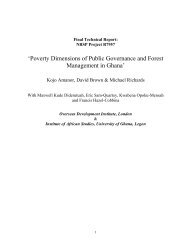The Gambian Tourist Value Chain and Prospects for Pro-Poor Tourism
The Gambian Tourist Value Chain and Prospects for Pro-Poor Tourism
The Gambian Tourist Value Chain and Prospects for Pro-Poor Tourism
You also want an ePaper? Increase the reach of your titles
YUMPU automatically turns print PDFs into web optimized ePapers that Google loves.
<strong>Tourism</strong> in <strong>The</strong> Gambia: International ‘Best Practice’ in Poverty Reduction & <strong>Pro</strong>-<strong>Poor</strong> Growth Through <strong>Tourism</strong><br />
Draft Report (Friday 22 nd December 2006)<br />
However, the local linkages in the <strong>Gambian</strong> tourism product compares favourably with<br />
Egypt – Africa’s second largest economy with a highly sophisticated tourist infrastructure.<br />
Note, in particular, how <strong>The</strong> Gambia captures at least as big a share of tourist spending on<br />
accommodation, shopping, excursions <strong>and</strong> food <strong>and</strong> drink as Egypt. As is argued later, this<br />
achievement has a significant impact on the flow of benefits from tourism to poor people in<br />
<strong>The</strong> Gambia.<br />
It is also interesting to note that, contrary to the assertions of the ‘leakage’ pessimists – in<br />
which most of the benefits of tourism are taken by tour operators <strong>and</strong> airline companies –<br />
the cost of air transportation to <strong>The</strong> Gambia <strong>and</strong> tour operators returns are not a<br />
disproportionate share of the total package cost, compared with other African destinations.<br />
To conclude this analysis of the <strong>Gambian</strong> tourism value chain <strong>and</strong> flow of benefits to the<br />
poor, our hypotheses about the importance of tourism to some poor countries <strong>and</strong> the fact<br />
that some benefits are accessed by the poor has been largely substantiated. First, the full<br />
tourism value chain in <strong>The</strong> Gambia, including discretionary as well as package spending, is<br />
extremely important to the macro-economy. Just over half of the £96m tourism value chain<br />
takes place in <strong>The</strong> Gambia – the off-shore activities relate to the international tour<br />
operators <strong>and</strong> airline companies. This suggests that, if external ‘leakages’ <strong>for</strong> <strong>Gambian</strong>based<br />
activities were reduced to zero, the tourism sector could contribute about £50m to<br />
an economy with a current national income of £213m per year -the equivalent of onequarter<br />
of total national income.<br />
Fruit sellers on the beach © Jonathan Mitchell<br />
Second, our analysis suggests that at least 7% of the total <strong>Gambian</strong> tourism value chain –<br />
<strong>and</strong> some 14% of the <strong>Gambian</strong>-based part of the value chain - flows directly into the h<strong>and</strong>s<br />
of the poor. Our hypothesis that tourism is inherently pro-poor has been supported <strong>and</strong>,<br />
further, that the extent of local linkages seems to be particularly rich <strong>and</strong> well-developed<br />
in <strong>The</strong> Gambia compared with other destinations. This is particularly the case <strong>for</strong> the<br />
smaller items of the value chain, such as shopping <strong>and</strong> excursions. <strong>The</strong> challenge presented<br />
by the larger elements of the tourism value chain, such as accommodation <strong>and</strong> food <strong>and</strong><br />
beverages, is to increase the pro-poor share of spending on these activities.<br />
In the following section, the issue of how to strengthen linkages between tourism <strong>and</strong> the<br />
poor will be structured around the components of the tourism value chain.<br />
32

















